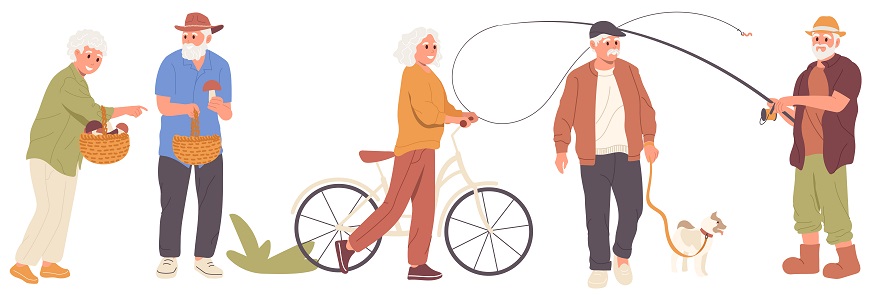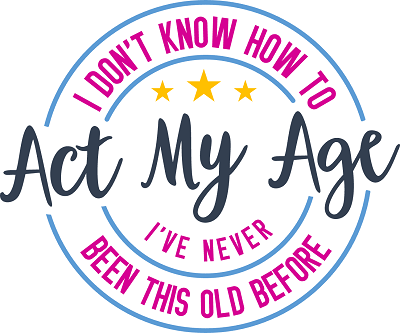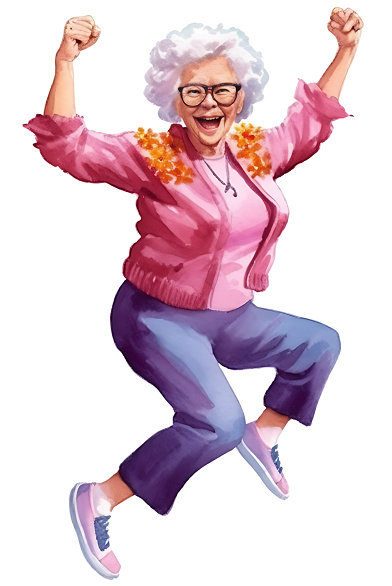 Turning 50 and beyond doesn’t have to mean simply surviving!
Turning 50 and beyond doesn’t have to mean simply surviving!
People are living longer than ever before and there is no reason that people over the age of 50 cannot continue to thrive and live an active and energetic lifestyle.
Those who are 50 and older are capable of vigorous exercise and being able to participate in all of life’s experiences without just having to be in survival mode.
You too can thrive in your 50s and beyond.
You need to take care of your body just as much as you did before 50 and maybe even more so. Your body has lived half a century and there are things you need to do in order to live the kind of life you were meant to have
Thriving After Age 50
Living past 50 is much more than just surviving. If you take care of your body, there is no reason you can’t do the things you have done throughout the previous 50 years of your life.
Thriving after the age of 50 doesn’t have to be a chore. You need to pay attention to your bodily cues so that you can address them as they come up.
- Exercise should be a part of your daily existence and you need to eat well in order to feed your body after 50.
- You need to eat healthy foods and stay away from processed foods that offer empty calories and can cause you to gain weight. By eating the proper foods and exercises, you can stay at a normal weight or achieve an optimal weight so that you can do the things you would like to do.
- Thriving versus simply surviving also has a lot to do with your mindset and how you perceive aging. People in their 70s are leading highly active lives, mainly because they believe they can.
- Thriving after the age of 50 also means taking part in the various medical screening tests offered. You need to consider having a colonoscopy at the age of 50, which is repeated every 10 years and which can help prevent colon cancer. Women need to partake in annual mammograms so that, if breast cancer is detected, it can be treated before it becomes a major health problem.
- Your doctor will likely screen you for diabetes and high cholesterol. If any of these are found to be abnormal, you may need to take medications or change your lifestyle in order to be healthier and live longer with a better quality of life. Screening tests for other diseases are also done, depending on your family and personal medical history.
- If you haven’t been exercising, you need to partake in an exercise treadmill stress test. This is an electrical study of the function of your heart where an EKG machine records the electrical activity of your heart while you are moving. If this is normal, you can safely partake in all sorts of exercises. If the test is abnormal, the doctor can help you improve the health of your heart so that you can exercise and maintain a fit status.
Your lifestyle doesn’t have to change drastically. You just need to make changes that reflect the status of your body.
Many lifestyle changes are easy to do after the age of 50 and will go a long way toward extending your life and allowing you to age gracefully through your 50s, 60s, 70s, and beyond.
Physical Health
Let’s face it. Your body isn’t the same as it was when you were 20. There have been many changes in your body over the years. Many of these changes can be overcome through proper dietary changes and exercise.
Many times, the initial stages of aging involve a decrease in the function of the musculoskeletal system. We lose muscle mass and gain fatty tissue. The eyes and ears begin to decline in function as well, often beginning in the late thirties. You can develop age-related hearing loss and presbyopia, which means that you don’t see things up close as well as you, did when you were younger.
Fortunately, most of the organs of your body start out at a capacity far above that which you need so that you can afford to lose a little bit of function before it shows up as declining physical health.
Even though you may have relatively normal physical health, declining health means that, as you age, your organs are more susceptible to stressors, including those found in strenuous exercising.
Extreme temperature variations can alter your physical health. The decline in physical health can also be seen in the inability to tolerate some of the drugs you are taking.
You stand a greater likelihood of having organ malfunction during periods of stress. Organs of the urinary tract, the brain, the blood vessels, and the heart also begin to decline as we age.
Some of the changes your body goes through after the age of 50 include the following:
Cellular Changes
The cells of your body do not function as well after the age of 50 when compared to the way the cells functioned when you were in your 20s. Cells are continuing to die off and are replaced by new healthier cells. This process doesn’t go as smoothly in your 50s as it did when you were younger.
There is such a thing as programmed cell death. It involves changes in the DNA of your cells that cause the cells to die at a certain age. This is believed to be why people don’t live much past the age of 100. This programmed cellular death is referred to as apoptosis. As the cells age, they undergo apoptosis so that there are fewer healthy cells in the body.
What You Can Do
People who don’t take care of their bodies undergo apoptosis faster than those who take care of their body.
Cells can only divide a certain number of times, after which they undergo apoptosis. When you feed your body healthier food, the cells are better able to thrive and will be around longer to keep you healthy. The same is true of regular exercise. You can help the cells of your body live longer by taking care of the entire body through activities that fuel the cell’s survival.
Aging Organs
The organs function only as well as the cells that make up the organs. Because the functioning of the cells diminishes as you age, the function of the organs also declines. Your kidneys have spent decades ridding the body of unwanted substances and tend to fail with age.
The blood vessels of the body continually build up plaque, which affects the function of the organs they provide blood to.
Kidney damage can also be a part of this process as there is often buildup of plaque in the blood vessels that provide blood flow to the kidneys. Some organs lose cells, which diminishes their function. Other organs maintain the same number of cells but the cells don’t function as well as they did when you were younger.
What You Can Do
You can help the organs of your body by avoiding processed foods that contain sugar, fat, and preservatives.
Exercise also improves the function of the organs of your body so that you can maintain an excellent health status.
By exercising, you can decrease the stress on the heart and decrease the damage to blood flow to the brain, which helps prevent heart disease and strokes. Often the function or lack of function of one of the organs of your body will negatively affect the function of other organs of your body.
As an example, decline in blood flow due to atherosclerosis can affect many of the organs of the body.
Bones and Joints
Your bones tend to become less calcified as we age. This causes a weakening of the bones and an increased likelihood of sustaining a fracture. Women after menopause lose bone much faster than they did before menopause because the ovaries used to protect bone loss by putting out estrogen.
It’s the calcium of the bones that cause the decrease in density of the bony matrix. The levels of vitamin D, which is important to bone health, also decrease as we age.
The spine can begin to suffer as a result of bone loss. Women who have a “Dowager’s Hump” are those who have sustained fractures as a result of decreased bone mass. This causes compression of the vertebra and deformed vertebra that cannot be made whole again. Changes in the cervical spine impact the space between the spinal column and the throat so that you can begin having swallowing problems.
What You Can Do
The best way to counteract the bony changes that affect you as you age is to continue to do weight-bearing exercises that will help maintain the strength of the bones.
The same is true of muscle loss. If you partake in anaerobic exercises that keep the muscles from deteriorating, you can prevent muscle loss so that you can be strong and healthy well into your elderly years.
The joints also deteriorate as you age. You can have a loss of the cartilage that results in osteoarthritis. You can prevent this from exercising smartly and avoiding sudden injuries or wear and tear injuries to the joints so that you can maintain the health of your joints.
The ligaments that hold the joints together become less elastic as you age. This causes an increase in stiffness of your joints. Gentle stretching prior to exercising can go a long way toward preventing the stiffening of the joints that occurs with age.
Body Fat and Muscle Changes
As mentioned, you go through a loss of muscle mass as you get older and this is often replaced by fatty cells. This change in your muscles begins sometime in your mid-30s. Some of the decrease in muscle mass is the result of declining testosterone levels in your system. Both men and women have testosterone that helps to maintain muscle mass.
The muscles are also unable to contract as quickly as they did when you were younger. You tend to lose fast-twitch muscle fibers faster than you lose slow-twitch muscles so you are less quick on your feet.
What You Can Do
There are things you can do to decrease the amount of body fat and musculature in your body as you age. By eating high protein foods and engaging in both aerobic and anaerobic exercise, you can maintain muscle mass and strengthen your bones in the process.
Resistance training is especially important to maintaining muscle mass. This is the kind of exercise you do with lifting weights, using exercise bands, or working on weight machines in the gym. If you can do this on a regular basis, you can increase your muscle mass and reduce the number of fat cells in your body.
If you choose to be sedentary, you can accelerate the loss of muscle seen in the aging process. This is why exercise is so important to the aging process and to your physical health.
Skin
Your skin tends to thin out as you age. It becomes less elastic (and thus the wrinkles you notice), and your skin will be drier than normal. Exposure to excessive amounts of sun can accelerate this process. Your skin will be blotchier and rougher as you get older.
The skin produces less collagen, which affects the elasticity of the skin. The number of nerve endings decreases in the skin as you age. This means that you feel things to a lesser degree as you get older.
There is also a thinning of the fatty layer beneath the skin. This means that your skin is less cushioned and is therefore less protected should you injure the skin in any way.
You have a decrease in the sweat glands, as you get older so you are less likely to perspire and have a greater chance of developing sunstroke because your body heats up faster.
What You Can Do – ADD MORE
The best thing you can do for your skin is to keep it moist with moisturizer and decrease your exposure to UV radiation from the sun. This will help keep your skin smooth and supple, even as you reach your older years. You can’t tan as well as you age because your body makes fewer melanocytes. This is probably a good thing because you really shouldn’t be tanning at this age.
You have a decrease in the amount of vitamin D absorption by the skin, as you get older. This may mean that you have to take some kind of vitamin D supplementation.
Reducing stress can really do a lot to keep skin young.
Regular healthy sleep patterns can also help you maintain a youthful appearance. Fatigue really shows on the skin.
It’s never too late to quit smoking. If you smoke, you are more likely to have to lines around the lips, making you look older.
Brain and Nervous System Changes
You have a decrease in the number of brain cells, as you get older. The brain tends to be able to compensate for this cellular loss by increasing the number of connections between the rest of the cells of the brain.
Contrary to popular belief, you can increase the number of brain cells, even when you are older, also the brain tends to have more cells in it than you need to function so you can afford to lose some, as you get older.
What You Can Do
The blood flow to the brain decreases with age so you are at a greater risk of developing a stroke. The best thing you can do is try to keep your brain functioning and active by participating in those activities that stimulate brain function, such as games, crossword puzzles, and Sudoku. Stimulation is the best way to keep the mind strong and working.
You can prevent strokes by eating foods and exercising so that cholesterol deposits don’t develop on the blood vessels that supply the brain.
Heart and Blood Vessel Changes
The cells of your heart become stiffer as you age and the blood vessels that supply the heart become filled with plaque and don’t expand as much when you exercise. The ability of your heart to pump is decreased and you are at risk for heart failure in your elderly years.
What You Can Do
If you continue to exercise your heart, however, you can maintain the strength of a healthy heart so that you don’t suffer from heart failure or other age-related changes in the heart.
You may have to modify your exercises so that you don’t over-stress your heart but maintain your heart rate within the target range as you exercise. There are many low impact workouts, like cycling and swimming that can help.
Lung Muscles and Breathing
The diaphragm tends to weaken as you age. You may also have a decrease in the air sacs and capillaries in the lungs as you age so that you don’t have good air exchange as you did when you were younger.
What You Can Do
You can counteract this by maintaining a healthy exercise program so your lungs can get some use out of regular aerobic exercise.
Aerobic exercise includes fitness classes, walking, running, cycling, swimming, and even dancing.
Energy Levels
Your energy levels can decrease with age. As you have fewer well-functioning cells in your body, you may find that you tire more easily and cannot keep up with people who are younger than you are.
You may find you need more sleep, even if you have decreased activity and decreased energy.
What You Can Do
Exercise
The best thing you can do for this is to remain physically active no matter how you feel. Physical activity actually enhances your ability to have high energy levels so exercise becomes more important as you get older.
You may find that a half hour of brisk walking or other physical activity can improve your energy levels so that you will find more energy to get through your day and enjoy all of the positive aspects of your life if you simply set aside a little bit of time each day to recharge your batteries.
According to the National Institute on Aging, regular exercise can improve your strength and increase your energy levels. Brisk walking, biking, gardening, and dancing are all great choices.
Regular Sleep
Harvard Medical School physician Julie K. Silver reports that aging can really disrupt sleep patterns, and poses an increased risk of insomnia. Create a bedtime ritual to prepare the body for sleep, reduce the load of your daily schedule, and go to bed at the same time every night.
Eat High Protein Foods
Foods high in carbohydrates stimulate the body to produce sleep inducing serotonin. Eat more protein instead, including fish, turkey, chicken, and eggs. Edamame, seeds, and nuts also provide you healthy fats and fiber to give you lasting energy throughout the day.
Lose Weight
Losing extra weight can really boost energy levels, according to Dr. Stewart, of Johns Hopkins University. Even a loss of 5% of body fat helps to improve mood, performance, and quality of life.
Learn Your Circadian Rhythms
Circadian rhythms are individual differences in daily energy patterns, which are determined by genetics and brain structure and differ from one person to another. This is what is referred to by the saying, “morning person.”
Once you know when you energy levels are at their peak, you can schedule demanding activities accordingly, instead of struggling through them during non-peak times.
Stay Hydrated
Water, herbal tea, and green tea can boost hydration, which boosts energy. Hydrating foods such as cucumbers, watermelon, and lettuce can do the same.
Don’t Smoke
If you smoke, talk to your doctor about how to quit. Quitting smoking can soar your energy levels, and greatly boost your health.
Stress Management
Stress is really a downer. It is exhausting for the mind, body, and spirit. There are many natural and effective ways to manage stress, including mediation, yoga, relaxation, being in nature, working less, and aerobic exercise.
Reducing stress promotes resilience, energy, an improved quality of life and a much more positive perspective on life.
Boost Vitamin and Nutrient Intake
The Mayo Clinic recommends older people to maintain optimal levels of vitamin intake, including, niacin, vitamin D, calcium, vitamin A, B, C, E, and folate to prevent fatigue and chronic illness.
Yoga
Yoga has so many benefits; it is truly a miracle practice, which is especially effective for boosting energy.
A study out of the University of Oregon found that 135 men and women subjects ages 65 to 85 had a great boost in energy levels after six months of yoga instruction.
Increase Intake of Omega Fatty Acids
Omega-3 oils have been found to boost alertness. A 2009 study from the University of Siena found subjects to have faster mental reaction times, and feeling more vigorous after taking a fish oil supplement for 21 days.
Eat Well
The link between what you eat and your energy levels cannot be denied. The body thrives when it is given proper nutrition. Nutrient-dense foods promote vitality, and energy, and can actually keep you going even at those times of the day when fatigue may hit.
Conversely, processed, high sugar junk foods do the opposite. These foods drag you down, and create crashes that interfere with your everyday performance.
AARP also recommends, eating smaller high protein meals more frequently throughout the day to keep those energy levels soaring.
Look for Red Flags
A study published in the “Journals of Gerontology,” reported that seniors who suffer from chronic fatigue are more likely to have some type of condition that leads them to hospital stays, and emergency room visits.
If fatigue is a major problem, then see your doctor to rule out any significant health conditions, such as depression, anemia, arthritis, or lung disease.
Mental Health
There is an increase in depression as you age. This is because there is less serotonin and norepinephrine in the brain, which are directly responsible for the development of depression.
Women can have more mood changes in their older years, particularly during menopause.
What You Can Do
The best thing you can do to enhance your mental health during the aging process is to stay mentally alert and to have a wide social circle of relatives and friends.
Being around people can help you maintain optimal mental health and avoid the phenomenon of social decline sometimes seen in the elderly population.
Healthy eating and exercise can decrease the risk of mental health changes and will decrease your chances of suffering from a mental disorder, as you get older.
Your Mindset
Thriving versus simply surviving in aging can simply be a matter of your mindset. If your set to believe that aging means a “particular” set of behaviors, like sitting in a rocking chair and knitting all day, versus climbing a mountain, then that is you are likely to behave.
This means that how your aging experience manifests, may be literally dictated by your belief system.
Emotional Health
You can suffer changes in your emotional health, as you get older. Older age lends itself to increased isolation and increased feelings of depression and despondency.
What You Can Do
You can counteract this effect of aging by remaining socially active, to ensure you thrive emotionally by having a close connection to people…
Go out with friends or family members on a regular basis and keep your mind sharp through games, crossword puzzles, reading, or Sudoku so that you can maintain emotional wellness throughout the entirety of your life.
Aging can mean extra idle time, and this is the perfect opportunity to find new adventures and enjoy things that you may not have had time to participate in before.
The ability to find meaning and joy in life can mean the difference between just surviving and thriving.
Hobbies, classes, pursuing interests and volunteer work can energize and promote you to thrive no matter your age.
Your Diet Matters
Your diet becomes more important as you get older. Your body does not tolerate highly processed foods that are high in sugar and preservatives and your metabolism slows down in part due to a natural loss of muscle mass that can lead to weight gain.
This means you need to make more food from scratch and stick to a whole food clean diet that is high in fiber, fruits, vegetables, whole grains, and lean meats.
You should eat less food than you did when you were younger because your caloric needs are less as you age.
If you stick with a healthy diet and exercise on a regular basis, you should be able to maintain better health, high levels of energy, and a much better quality of life well past your fifties.
Final Thoughts
Being 50 years of age or older doesn’t mean that you have to suffer with poor health, both physically and mentally.
If you stay socially active, eat a healthy diet, exercise at least 150 minutes of moderate activity per week, and engage in activities that promote high energy levels you will not just survive your will thrive!


